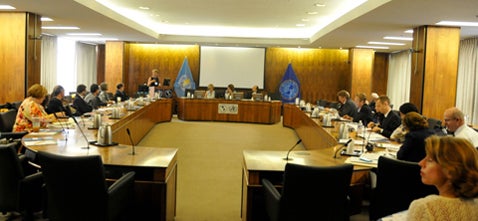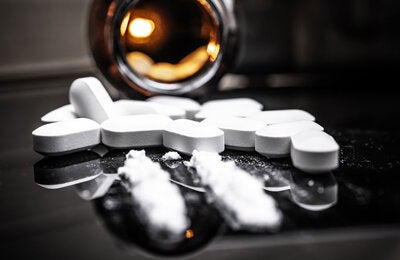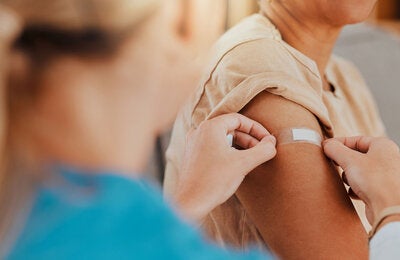

A new consortium convened by the Pan American Health Organization/World Health Organization (PAHO) and comprised of more than 20 health and nutrition experts from governments, civil society, universities, and representatives...
Washington, D.C., August 30, 2012 (PAHO/WHO) — A new consortium convened by the Pan American Health Organization/World Health Organization (PAHO) and comprised of more than 20 health and nutrition experts from governments, civil society, universities, and representatives from major food and beverage companies, committed to work on reducing dietary sodium after a two-day meeting on August 28-29, 2012 at the PAHO's headquarters in Washington, DC.

The group agreed that a coordinated, salt-smart approach is needed for the region of the Americas, and joint action for a healthy heart would save lives and reduce the growing costs associated with non-communicable diseases (NCDs) in the region.
"Excess salt is far common in our modern diet, and we all know that a grain of salt goes a long way. All stakeholders have a role to play, so let's work together and commit to a common way forward," PAHO Director, Dr. Mirta Roses Periago, said.
Typical modern diets provide excessive amounts of salt, from early childhood through adulthood. Consumption of more than 5 grams per day in a given population is known to increase the overall prevalence of high blood pressure. High blood pressure is the leading risk factor for death from heart attacks, strokes, and kidney and heart failure. In many countries of the Americas, salt consumption is three times the recommended level.
"Excess salt consumption is a clear public health challenge for the region and reducing dietary salt is a clear best buy for all of society," said Dr. Branka Legetic, regional advisor for NCDs at PAHO/WHO.
Major food and beverage companies expressed commitment to a multi-stakeholder initiative, a new partnership model being used by PAHO under the Pan American Forum for Action on NCDs (PAFNCD) to engage all-of-government and all-of-society to address critical issues in chronic disease prevention and control.
Agreement was reached to implement a common, stepwise approach to dietary salt reduction, with industry and government support, and consumer awareness efforts. The consortium will work together over the coming months to develop a positive environment to reduce salt consumption in the region of the Americas, setting specific goals and timelines, with industry continuing to progressively reformulate products, governments considering appropriate guidelines, policies, and legislation, and all partners supporting efforts in advocacy, communications, and social marketing.
"There was clear recognition that working in silos has not produced the necessary intended results to reduce excessive sodium consumption in the diet. All stakeholders have a role to play, and previous efforts have shown that when governments engage with industry and civil society to reduce salt in food, they can achieve success," said Dr. Irene Klinger senior advisor at PAHO/WHO and coordinator of the PAFNCD.
The Pan American Forum for Action on NCDs (PAFNCD) is an initiative of the Pan American Health Organization/World Health Organization conceived as a platform for a whole-of-government and whole-of-society effort to confront the NCD epidemic in the Americas by mobilizing partners to work together through new innovative initiatives that promote health at all levels, reduce the growing costs associated with NCDs, and save lives.
PAHO, which celebrates its 110th anniversary this year, is the oldest public health organization in the world. It works with its member countries to improve the health and the quality of life of the people of the Americas. It also serves as the Regional Office for the Americas of WHO.
Links:
- Pan American Forum for Action on NCDs
- Twitter: @NCDs_PAHO / @pahowho
- NCDs facebook
- www.paho.org/paho110/
- www.paho.org
- youtube
Media Contacts:
Leticia Linn, linnl@paho.org, Tel. + 202 974 3440, Mobile +1 202 701 4005, Donna Eberwine-Villagran, eberwind@paho.org, Tel. +1 202 974 3122, Mobile +1 202 316 5469, Sonia Mey-Schmidt, maysonia@paho.org, Tel. + 1 202 974 3036, Mobile +1 202 251 2646, Knowledge Management and Communications, PAHO/WHO—www.paho.org



